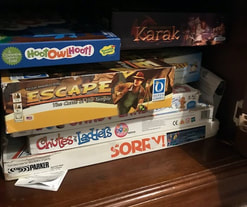 We're gamers in this house. Being a 'gamer' has a lot of different meanings these days, but most of them apply! I grew up as my brother's competition on a lowly Nintendo (original, and we had 2 games). He brought the first game console into our house, moving through Xboxes and PlayStations. Learned shooters and farming games. I ran with Mario. I flew with Spiro. On the computer, I was the master of Fury (a jet-fighter game) and I played through Diablo more times than I could count. But more than any of these, we play games together on the dining room table . Our family knew many card games, and we all played ramole on camping trips, betting with chips or piles of pennies. We have a cupboard of board games now. The picture above is the kid's smaller version. Why games? It was where I learned about taking turns. I learned math playing cribbage with my parents. I learned strategy with my sister's chess board. And I learned about losing while playing games. My parents were not the kind who would let the child win. We lost a lot at first. I should have known my younger brother would be my better when, at the age of six, he beat me at chess. But we learned by mimicking our opponent's strategies. We improved. We learned to be gracious victors. And we came to see how all the skill in the world could be outdone by luck, yet skill paid off in the long run. I had the chance to join a Dungeon & Dragons group in high school, and that taught me a lot. I became a Game master after that, where I organized the adventures and guided characters through. Those familiar with the game will know that 'guided' is used loosely; players have a tendency to run off in any and every direction EXCEPT the one a GM is trying to point them to. I learned improvisation. I figured out what people enjoyed in their stories, and when they got bored. I became a story teller. Has it been a while? Is it time to pull out that deck of cards and find a friend to play?
0 Comments
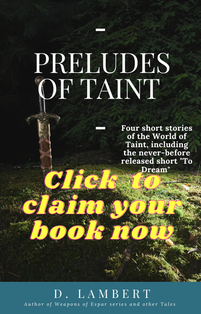 It took a bit of elbow grease (and some helpful people down in the support community on Weebly) but I got it working! As of now, when you sign up for the Newsletter, you immediately get access to a free anthology; four short stories from The World of Taint! Check out the stories below, then click on the image to sign up and claim a copy! 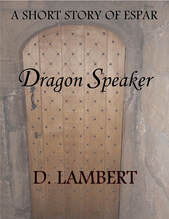 Dragon Speaker (previously published in printed anthology Sooke Writes Again) As Master Wizard Foran Kinotela prepares to embark upon a quest to save magic, he is the victim of a theft. Finding the stolen enchanted amulet is simple; it's around the thief's neck. But as he moves to take back his goods, the thief stumbles into a potential alliance for Foran's quest. Will the dragons listen to him, or to the thief? 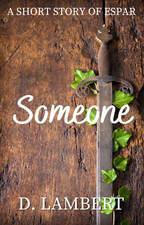 Someone (previously published in printed anthology Lucky Number seven) Aleen took a chance and helped a stranger. But his presence upsets her world; her partner is now threatening her, they've found a theif among them, and she may attract the attention of the Lionians who rule Espar. But now she doesn't want to let him leave. 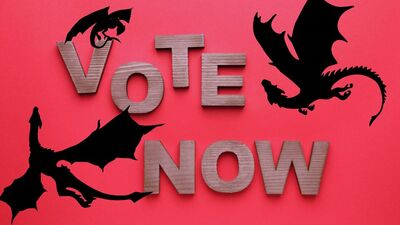 Black Arrow (Soon-to-be published in printed anthology #8) He was a slave with a single gift; the ability to read. When the right book falls into his hands, Maltor discovers a world unlike any he has known and begins to believe in something he had never before considered: Hope. He will be a legend. To Dream EXCLUSIVE: ONLY available through this offer: Arekson is meant to be following the prescribed course of his life on Wanter; teaching magic. But rumors of a new kind of thinking drew him outside the polished existence he had believed in. The words spoken by the stranger threaten everything he thought he knew. Dare he risk it all for the chance to dream for himself? Reading is an escape. We love to curl up with a book and a cup of tea as the rain pelts down (common enough around here!) and leave the world behind. A good book draws you in like a fuzzy blanket, wraps you up, and makes you never want to leave.
But then, it happens. The author slips up, and something snaps you right out of the world. For me, it was a horse. Apparently, the horse was greeting a nearby person in a barn with a whinny. It kicked me so far out, I stopped reading. Horses whinny to call to another animal at a distance. It’s LOUD. They don’t whinny to greet; they nicker. A simple word choice, and I was jarred. If we, as authors, state a fact that is glaringly incorrect, we risk ruining that deep connection our reader had with the story. While being accurate is best across the board, here are four particular areas to pay close attention to! 1. Military. I mention this first because while many people write it, but few truly know the topic! There are more than just facts to know about any representation of military bodies in novels; there’s an entire culture. It’s how people talk, walk, sleep, and breathe. If you have not lived the life, you need someone who has lived it to read the sections relating to military affairs and check it for authenticity. Military novels (historical, contemporary, and SciFi) have a huge audience. Even if the reader has not been directly involved in the military, they probably have read enough military fiction to know what to expect and recognize when it goes awry. 2. Location If you set your fiction novel in a real place, get out the map and get it right. Anyone who has visited or lived in your setting will immediately recognize if you fudge a street name or a distance between two landmarks. Never been there yourself? Google maps or local newspapers can go a long way to add authenticity, but get a local to read it too! 3. Professions There’s a lingo to every profession. I’m a veterinarian, and I talk to vets differently than I do other people. They know what I mean when I say a patient ‘smiles.’ Or if I write COHAT as a recommendation. A plumber uses different slang for their tools than a carpenter does. A chef called that vegetable ‘shrooms.’ Don’t give a surgeon painted nails (you’re not supposed to have nail polish!!), and don’t let a hunter have a pistol in Canada. There are exceptions, but you’d better explain! We have to be careful we don’t get so into our vocabulary that we lose the reader, but a detail or two can cinch up a character perfectly, just as incorrect use can jar the reader. 4. Body language. It’s not just for humans. Humans are probably the hardest because they lie, but it takes an excellent con to lie with their body language. Discrepancies between body and voice add fabulous subtext, but it has to be done right. Be conscious of what the body language is saying. People tend not even to be able to explain what they know about body language, but we all pick up on it subconsciously. Use it! And don’t forget animals. A cat who narrows its eyes before striking rings untrue; cats have wide eyes when stressed. Narrowed eyes are a kitty smile! Animals do not often lie, although sometimes it happens! There will be moments when you have something that appears ‘wrong’ on first pass. A dog may wag its tail while growling. Maybe it’s just happy to attack! But if there is a discrepancy, it has to be explained at some point. Larry Correia was once taken to task by a reader who pointed out that Hind helicopters could not hover in the manner he described. Before he could reply, the reader wrote back, “Never mind. Magic Orc pilot,” and the matter was closed (Correia’s orcs had specialties they were essentially supernatural with; that orc’s was the helicopter.) An explanation will diffuse the ire. Leave it out, and your readers will have every right to call you on your ‘mistake’! What else have you noticed an author getting wrong that threw you out of the story? |
D. Lambert, authorFantasy novels that entice, inspire, and entertain. Archives
May 2024
Categories |

 RSS Feed
RSS Feed